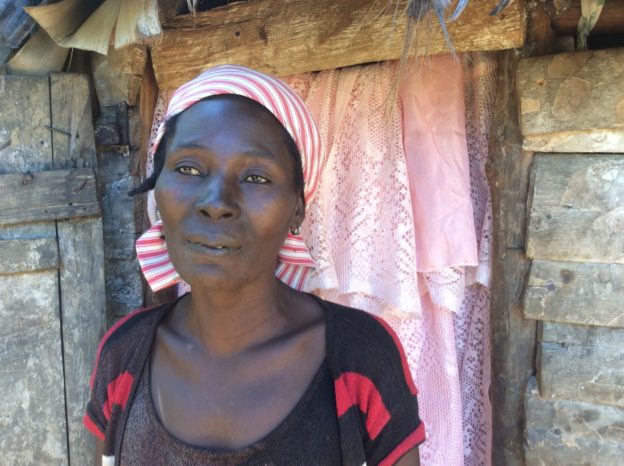Laumène lives in Gwo Labou, a sweeping mountain community just across the river from the road that leads through Kolonbyè to downtown Savanèt. She joined the CLM program in August, and has been receiving home visits for almost a month.
She’s not sure how old she is, but her life has already been full. She’s not from Gwo Labou, but from Lasous, a more remote area farther into the mountains. Her mother gave birth to twelve children, but only seven of them survived. None were able to go to school.
Her first partner was a young man from the same area. When they fell in love, he sent his parents to her parents to ask for her hand. They had six children and they struggled together. Four of the children survived. He would farm a small garden on land that belonged to his father, but it was never enough. When money and food would start to run out, he would sneak across the Dominican border to look for work. That’s where he died, hacked to death with machetes in a dispute with Dominicans.
After he died, she began to have trouble with his family. She didn’t like the way they treated her and her children. So she took the kids and moved back in with her family. When her second partner asked her to move in with him, she agreed. He was already married, but her parents couldn’t help her, so she didn’t see any other reasonable choice. When her father passed away, her mother even joined her in the small yard when her partner built her a home.
They’ve had seven children together and lost two. The five who remain still live with her. Her partner continues to live mainly with the other woman, with whom he has six children. This other woman is his “madanm marye,” or principal wife. In Haitian Creole, the two women are matlòt, the word for women who share the same partner, a situation that is not unusual in the Haitian countryside.
When asked why she thinks the CLM team chose her for the program, she has a simple answer, “Yo pran m paske m malviv.” “They took me because I live badly.” Four of her younger children should be in school this year, but she isn’t sure yet how she’ll send them. Last year, she counted on a small community school that was organized in a roughly constructed palm-leaf tent a few minutes up the hill from her home. But she’s not sure when it will open this year or where she’ll get the 350 gourds – currently about $5.50 – it will cost for each child. And that doesn’t include the cost of uniforms or books or pencils and pens.
She simply and accurately describes the poverty trap she lives with. Gwo Labou is a farming community. “Travay,” the Creole word that generally means “work,” is a synonym for “to farm” in the general parlance there. “If you don’t have means to work, you won’t have a big harvest. When you bring it to market to sell, you won’t be able to buy what you want and need. My husband has to work in his wife’s field first. Then he can help me out a little. But I don’t have the money to buy seedlings. I have to make do with whatever seeds I can borrow. People will lend you seeds for the summer planting, but you have to have your own in the fall.”
Though she’s only just started in the CLM program, Laumène has already adapted well to some of the routine. Her case manager, Martinière, has given her two goats, and she knows just when one of them was mounted by a buck. She also remembers enough from her enterprise training to know when she’ll have confirmation of its apparent pregnancy. She’s working hard to learn to write her name, but she has a long way to go. To this point she can only write the first two letters. She remembers much of what she heard from Martinière already about Vitamin A, and willingly joins his responsive sermon about fresh fruit and Sweety, the cheap powdered drink that is popular in rural Haiti.
“If you sell your fresh fruit in the marketplace to buy Sweety for your kids, you’re selling what?”
“Health.”
“And buying what?”
“Malnutrition.”
She doesn’t yet have a plan, only a vague hope. “Yo wè w pa alèz. Yo mete w nan chemen an. Ou travay. Ou pa parese. W ap genyen pi devan.” “[The CLM team] sees that you’re not living well, and they put you on the right path. But you work. You’re not lazy. And so you can succeed.”
